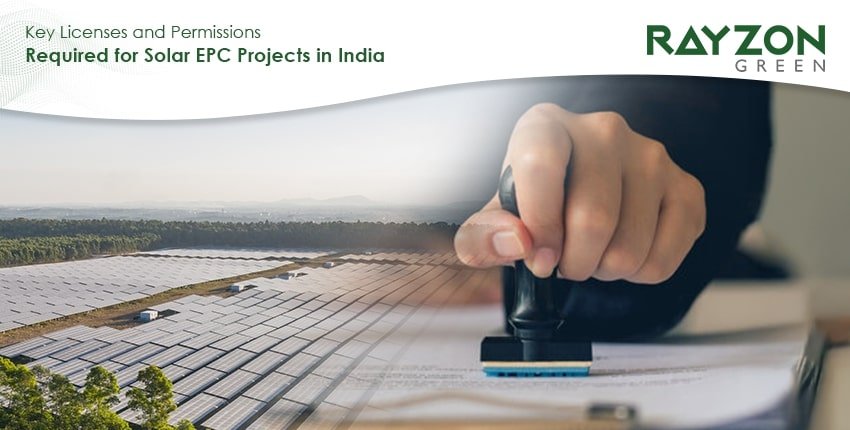
In India’s growing solar sector, planning and executing a successful Solar EPC project requires more than just technology and design. It involves obtaining several key approvals, permits, and clearances from government and regulatory bodies. Whether it’s a ground-mounted solar system or a rooftop commercial installation, every Solar EPC project in India must align with central and state-level regulations to ensure smooth execution and long-term operational success.
Understanding the Solar EPC project licenses in India is crucial for stakeholders, developers, and industries who want to harness solar energy effectively. Without proper permissions, even the most well-designed solar project can face costly delays, legal hurdles, or even cancellation. This blog serves as a comprehensive guide to help you navigate the solar energy regulatory permissions needed to build and operate a compliant, sustainable solar EPC project in India.
Implementing a solar EPC project in India involves navigating a complex landscape of permissions across different authorities. Below are the core licenses and approvals required for any successful project rollout:
One of the first steps in obtaining solar EPC approvals in India is getting an NOC from the local DISCOM (Distribution Company). This is crucial for projects that require grid connectivity, especially for net metering or open-access solar EPC.
🔗 Learn more: Net Metering for Commercial and Industrial Solar Projects
Each Indian state has its own solar policy. The state electricity board plays a vital role in permitting connections and ensuring projects comply with state-wise solar licensing processes.
🔗 Related: Top Solar EPC Companies in India 2025
CEIG approval is mandatory for safety and electrical standards compliance. This is especially essential for utility-scale solar EPC and ground-mounted solar projects.
🔗 Also Read: Comprehensive Solar EPC Solutions
For large-scale solar EPC projects, especially those covering vast land areas, obtaining an Environmental Clearance (EC) is essential.
🔗 Related blog: How Solar EPC Supports Energy Independence
This falls under both "Consent to Establish" (CTE) and "Consent to Operate" (CTO) from the respective State Pollution Control Boards (SPCB).
For ground-mounted solar EPC projects, land acquisition is one of the most complex parts. This includes:
🔗 Explore: Ground-Mounted vs Rooftop Solar
Especially important for rooftop solar EPC:
🔗 Visit: Industrial Rooftop Projects List
This is one of the most critical solar EPC project licenses in India. It enables the consumer to send excess solar electricity to the grid and receive energy credits.
🔗 Discover: 5 Ways Solar Energy Increases Property Value & Sustainability
Open-access solar EPC allows large consumers to buy power from developers.
🔗 Must-read: Solar EPC Services Are Shaping Sustainable Future
It is essential to align your EPC contracts with legal regulations regarding:
🔗 Explore our expertise: What is EPC in Solar Projects
While not a license per se, applying for solar energy subsidies through central or state schemes is a key part of the EPC process—especially for residential and C&I customers.
🔗 Related blog: Smart Solar Financing in India
Before applying for any permissions, a thorough site survey and grid feasibility study must be conducted. This lays the groundwork for smoother approvals across DISCOM, CEIG, and SLDC channels.
🔗 Related: Ground-Mounted Solar Projects
A successful solar EPC company ensures all documentation is aligned before initiating licensing procedures. This includes:
🔗 Read more: 15 Key Questions About Solar EPC
For MSMEs and industrial units, the approval process varies slightly due to building code compliance, local fire department NOCs, and pollution control certifications.
🔗 Explore: Solar EPC for Industries
Hiring a professional, licensed Solar EPC company in India ensures that all approvals—from CEIG to environmental clearances—are obtained seamlessly and without delays.
🔗 Learn why: Best Solar EPC Company in India
Acquiring the correct solar EPC project licenses in India is the backbone of a legally compliant and high-performance solar project. Without proper documentation and permissions, your solar plant could face serious operational, financial, or legal barriers. That’s why it’s vital to partner with an experienced EPC provider who understands these intricacies.
Rayzon Green specializes in end-to-end Solar EPC services, guiding industries and commercial clients through every stage—right from licensing to installation. With years of experience in navigating the solar project clearance process, we ensure your projects are not only compliant but also optimized for long-term success.
If you're planning a solar energy project and want expert help in obtaining the necessary solar EPC project licenses in India, look no further than Rayzon Green. Our experienced team ensures seamless approvals, legal compliance, and turnkey project delivery across India.
🔗 Contact Us Now or explore our Services and Projects to get started.
1. What licenses are mandatory for a Solar EPC project in India?
DISCOM NOC, CEIG approval, environmental clearance, and net metering approval are among the most essential licenses.
2. How long does it take to get all solar project approvals in India?
It can take 3–6 months, depending on the project type, location, and state-specific policies.
3. Is CEIG approval needed for all solar EPC projects?
Yes, it is mandatory, especially for grid-connected systems above a specific capacity threshold.
4. What is the process of getting net metering approval in India?
Submit an application to the DISCOM, get technical feasibility clearance, install meters, and complete inspections.
5. Do rooftop solar systems also require government permissions?
Yes, they require structural clearance, DISCOM NOC, and net metering approval, among others.
India’s push toward sustainability has accelerated the demand for solar EPC solutions. At Rayzon Green, we’re proud to be driving this momentum forward. Our recent industrial rooftop project in Gujarat not only met all licensing norms efficiently but also contributed to massive carbon reduction.
🔗 Explore: Impact of Solar EPC on Carbon Reduction
For more insights, don’t miss: